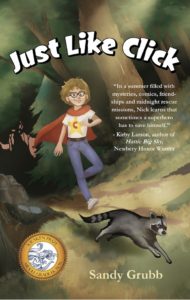“Location, Location, Location”
Let’s face it—location matters and not just in real estate. If the hero of your story is battling pirates, it’s a much different story if the hero’s ship is sailing on rough seas off the coast of Somalia versus floating in a wading pool in the backyard. Imagine how different the books on this list would be if the settings were changed up:
- Charlotte’s Web in a spaceship to Mars instead of the Zuckermans’ farm
- The Girl Who Drank the Moon in an Arizona desert instead of a forest filled with dangers
- Maizy Chen’s Last Chance in Switzerland instead of well…Last Chance
- Freewater in the Rocky Mountains instead of the Great Dismal Swamp
The setting for the stories I write have always come to me before I choose my characters and figure out my plots. I’m not saying it must be that way, it’s just the way it’s worked out for me so far. Someday, I may take on the challenge of building a magical world, but for now, I find great satisfaction in writing contemporary stories.
Setting sets the stage. It conveys the time and place for the events of your story, where characters must face their challenges and come out on the other side changed for the better. Your setting needs to fit the kind of story you’re writing.
Setting defines limits and possibilities. If your character must confront magical swamp characters, it’s most likely not going to happen in a New York City highrise, though that could possibly be interesting. One challenge in writing is to avoid overly-used tropes. “It was a dark and stormy night” is perhaps the most famous setting cliché of all time. This was the opening line in a 19th century novel by the English author Edward Bulwer-Lytton. Edgar Allan Poe used it the following year as the opening line of a short story. It may have been left buried in time if it weren’t more recently used by Madeleine L’Engle as the opening line of A Wrinkle in Time and then over and over again by Snoopy of the Peanuts comic strip. Poe, Charles Schultz, and L’Engle knew full well they were taking a cliché from the past for a new double entendre effect.
When done well to full advantage, the setting becomes like another character in the story. By changing the season, time of day, lighting, weather, sounds, and smells an author can communicate emotions and tension in their story. In an early chapter of Just Like Click, Nick heads out at midnight to meet Celia for the first time. We read, “A gnarly pine snag sneers at me. I turn toward the stream. The inky black waters rush by chanting, Die, die, die.” With this setting description, it’s easy to know how Nick is feeling about being outside alone in the middle of the night without just typing “Nick was scared.” In addition, readers experience the setting with Nick.
Do you want to try some brainstorming?
What are some settings you may want to use for a story? Can you list five?
What kind of story might take place in each setting? In each case, think of events that could happen only in that setting.
Have fun with your writing. Use your imagination. Try new things. Writing takes courage—be brave!
Published April 16th, 2024 by Fitzroy Books/Regal House Publishing
About the Book: Nick Townley has lived his entire life—all eleven years—at Black Butte Ranch, nestled in the foothills of the snow-capped Cascade Mountains. While his parents push him to study, practice sports, and make friends, Nick prefers to retreat into his superhero universe and create exciting Adventures of Click comics. When a string of robberies threatens Dad’s job, forcing them to move across the country, Nick’s world implodes. He loves his home, and what will he do about the $237,000 in cash under his bed that Great Gramp gave him before he died?
Desperate to stop the move, Nick steps off his comic book pages and ventures into the night as Click, an undercover superhero. Catching thieves would be a lot easier if he had actual superpowers. When three new kids discover his identity and want to join him, Nick vows to stay undercover…until he realizes even a superhero needs friends. But can he ask them to put their lives in danger to save his home? What would Click do?
About the Author: Sandy Grubb has been writing children’s stories since she was a child herself. Her debut novel, Just Like Click, won the esteemed Kraken Book Prize, recognizing finely crafted middle grade fiction. When not at home in Lake Oswego, Oregon, Sandy and her family can often be found exploring nature trails and playing badminton at Black Butte Ranch, just like Click…and Nick!
sandygrubb.com
X: @sandygrubb
IG: sandygrubb
Facebook: sandygrubb
Thank you, Sandy, for this reflection on setting!


